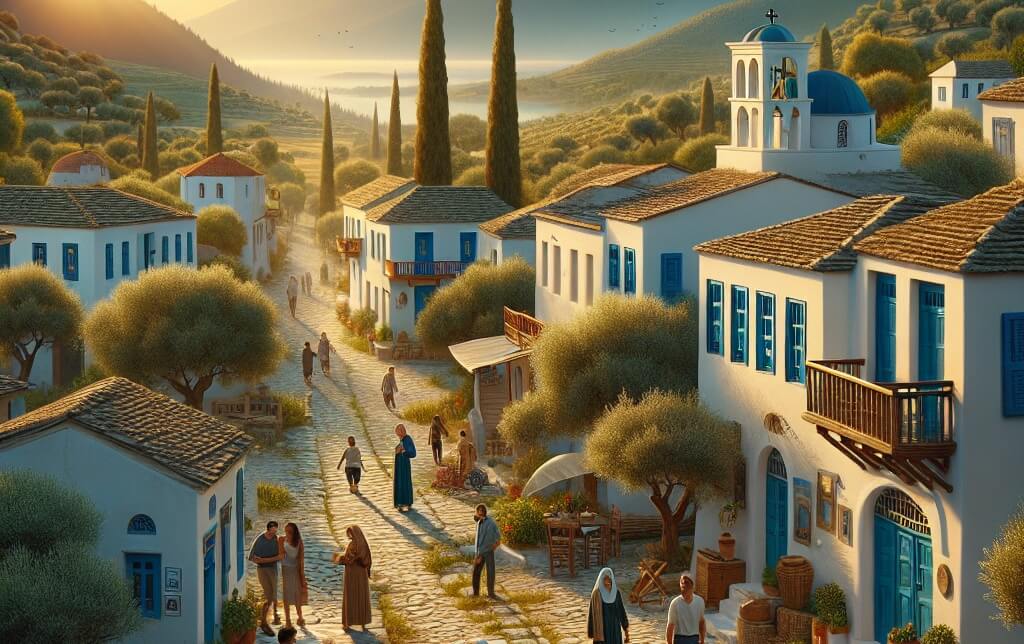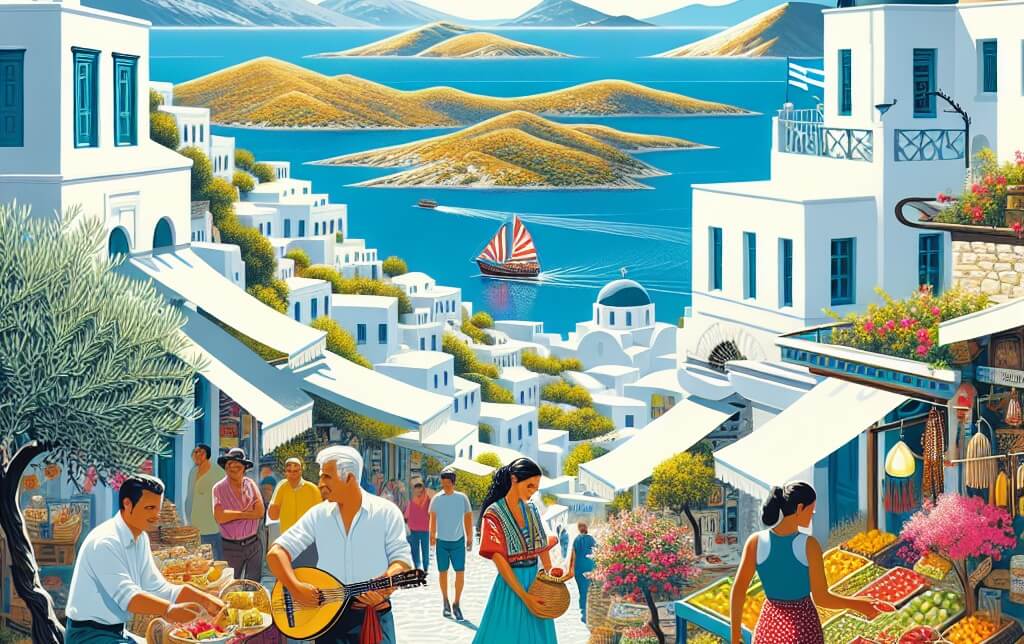
Discover the Hidden Gem of Vathia, Greece
Vathia, a small village located in the Mani Peninsula of Greece, is often hailed as a hidden gem waiting to be discovered by travelers seeking an authentic and untouched glimpse into Greek history and culture. This picturesque village, characterized by its distinctive stone tower-houses perched on a hillside overlooking the azure waters of the Mediterranean Sea, offers a unique opportunity to step back in time and immerse oneself in the rich traditions of the region. The well-preserved architecture, narrow cobblestone streets, and breathtaking panoramic views make Vathia a truly enchanting destination for those looking to escape the bustling tourist crowds and experience the beauty of rural Greece. A visit to Vathia promises a peaceful retreat, where visitors can savor the tranquility of the countryside, explore ancient ruins, and engage with the warm hospitality of the local community. Uncover the hidden gem of Vathia and unlock a world of beauty, history, and serenity in the heart of Greece.
I. Introduction
I. Introduction Vathia, a small village located in the Laconia region of Greece, holds a significant place in the country's cultural and historical landscape. Known for its well-preserved stone tower houses, Vathia stands as a testament to the traditional architecture and way of life of the Mani Peninsula. The village's unique and picturesque setting, perched atop a hill overlooking the azure waters of the Mediterranean, has captivated visitors and researchers alike. In this context, the exploration of Vathia offers a glimpse into the rich heritage and enduring charm of rural Greece.
II. Historical Background
The historical background of Vathia, Greece is deeply rooted in its architectural heritage and strategic significance. Vathia is a small village located in the Mani peninsula of the Peloponnese region. It is renowned for its unique tower houses, which were built by the Maniots as a means of defense against invaders during the turbulent times of the Ottoman Empire. These tower houses served as both residences and fortresses, showcasing the resilience and resourcefulness of the local inhabitants. The history of Vathia is intertwined with the struggles for independence and sovereignty that characterized the region's past. Today, Vathia stands as a testament to the rich history and cultural heritage of Greece, attracting visitors from around the world to marvel at its architectural marvels and storied past.
III. Geographical Location
Vathia, Greece is a picturesque village located in the southern part of the Peloponnese peninsula. Situated on the Mani Peninsula, Vathia overlooks the sparkling waters of the Mediterranean Sea. Its geographical location is characterized by rugged cliffs, rocky terrain, and breathtaking views of the sea. The village is known for its distinctive tower houses, which stand as a testament to its rich history and traditional architecture. Vathia's location offers visitors a unique and tranquil setting, perfect for those seeking a peaceful retreat amidst the stunning natural beauty of Greece.
IV. Architectural Heritage
The architectural heritage of Vathia, Greece, holds a significant place in the country's historical and cultural landscape. Vathia is renowned for its well-preserved traditional stone tower houses, which stand as a testament to the region's unique architectural style and craftsmanship. These structures, built during the 18th and 19th centuries, showcase the ingenuity of the local builders and the strategic importance of the village during that time. The intricate design and layout of the buildings reflect the social structure and defensive needs of the community, providing valuable insights into the history and development of the area. Preservation efforts and recognition of Vathia's architectural heritage are essential to safeguarding this important aspect of Greek cultural identity for future generations.
V. Cultural Significance
The village of Vathia in Greece holds significant cultural importance due to its well-preserved traditional stone tower houses that are emblematic of the region's historical heritage. These unique structures, built during the 18th and 19th centuries, serve as a tangible link to the past, showcasing the architectural prowess and lifestyle of the Mani Peninsula's inhabitants. The village's cultural significance is further enhanced by its remote location and rugged landscape, which have helped to maintain its authenticity and charm. Vathia's architectural legacy stands as a testament to the region's rich history and serves as a cultural beacon, drawing visitors and scholars alike to appreciate and study its unique heritage.
VI. Tourism and Attractions
Vathia, Greece, is a picturesque village known for its well-preserved medieval tower houses that offer a glimpse into the region's rich history and architectural heritage. As a popular tourist destination, Vathia attracts visitors from around the world who are drawn to its unique charm and cultural significance. The village's stunning views of the Aegean Sea and its proximity to beautiful beaches make it an ideal location for those seeking a peaceful and relaxing getaway. In addition to exploring the historic tower houses, visitors can enjoy hiking trails, local cuisine, and traditional Greek hospitality. Vathia's tourism sector continues to thrive, offering a memorable experience for travelers seeking an authentic taste of Greek culture and history.
VII. Natural Environment
Vathia, Greece is characterized by a unique and diverse natural environment that plays a significant role in shaping the region's identity and cultural heritage. The rugged landscape of Vathia is dominated by rocky cliffs, crystal-clear waters, and lush vegetation, creating a picturesque setting that attracts visitors from around the world. The Mediterranean climate of the area contributes to the rich biodiversity found in Vathia, with a variety of plant and animal species thriving in the region. The natural environment of Vathia is not only a source of beauty and inspiration but also a vital component of the local economy, supporting activities such as agriculture, fishing, and tourism. Efforts to preserve and protect the natural environment of Vathia are essential to ensure the sustainability and well-being of the region for future generations.
VIII. Ghost Town Phenomenon
The phenomenon of ghost towns, such as the one in Vathia, Greece, can be attributed to a variety of factors that have contributed to the abandonment of these once-thriving settlements. Economic decline, natural disasters, and changing social dynamics are often key elements in the transformation of a bustling town into a ghostly remnant of its former self. In the case of Vathia, the decline of traditional industries, coupled with the migration of younger generations to urban areas in search of better opportunities, has resulted in a dwindling population and the eventual abandonment of many homes and businesses. The preservation of ghost towns like Vathia serves as a poignant reminder of the transient nature of human settlements and the importance of understanding the historical and cultural significance of these places.
IX. Seasons in Vathia
In Vathia, Greece, the seasons hold a profound significance that shapes the rhythms of daily life and the cultural identity of the region. The seasonal changes in Vathia are not merely markers of time, but rather integral components of the community's agricultural practices, festivals, and traditions. From the vibrant colors of spring blossoms to the golden hues of autumn foliage, each season in Vathia brings its own unique beauty and character. The people of Vathia have long been attuned to the cyclical nature of the seasons, drawing inspiration from the land and the changing weather patterns to inform their way of life. As such, the seasons in Vathia are not just a backdrop, but a central theme that weaves through the fabric of daily existence, connecting past, present, and future in a harmonious tapestry of nature's cycles.
X. Conclusion
In conclusion, the historical significance and natural beauty of Vathia, Greece make it a remarkable destination for travelers seeking a glimpse into the past and a connection to the rugged landscape of the Mani Peninsula. The well-preserved stone towers that dot the hillside serve as a testament to the region's rich history and the resilience of its inhabitants. The picturesque setting, overlooking the crystal-clear waters of the Mediterranean Sea, offers a serene and captivating backdrop for exploring the unique cultural heritage of this remote village. Visitors to Vathia are sure to be enchanted by its charm and intrigued by its storied past, making it a must-visit destination for those seeking an authentic Greek experience.
Integration of Pertinent Points:
In the integration of pertinent points regarding Vathia, Greece, it is essential to consider the historical significance and architectural uniqueness of this remote village. Situated in the Mani Peninsula of the Peloponnese region, Vathia is renowned for its well-preserved tower houses, which serve as a testament to the area's rich cultural heritage and strategic importance during the Byzantine and Ottoman periods. The verticality of the stone structures, with their distinctive crenellations and narrow windows, reflects the defensive nature of the village and its role in safeguarding against invasions. Furthermore, Vathia's location overlooking the sea offers breathtaking views and adds to its charm as a destination for cultural enthusiasts and history aficionados alike. Thus, the integration of these pertinent points underscores the significance of Vathia as a cultural gem that warrants preservation and appreciation for future generations to cherish.









